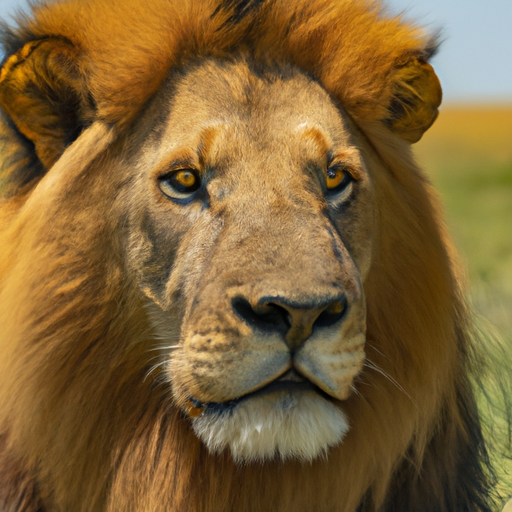So, you’re curious about lion conservation programs in Africa, huh? Well, you’ve come to the right place! Today, we’re going to satisfy your inquisitive mind by exploring the existence of such programs on the vast continent. Lions, one of Africa’s most iconic and majestic creatures, have been facing numerous threats to their survival in recent years. From habitat loss to illegal hunting, these magnificent animals are in desperate need of our help. Luckily, there are dedicated conservation programs in Africa that are working tirelessly to protect and preserve the lion population. Let’s delve into the fascinating world of lion conservation and discover the incredible efforts being made to ensure their survival in their natural habitat.
Lion Conservation Programs in Africa
1. Introduction to Lion Conservation Programs
Lion conservation programs in Africa play a crucial role in safeguarding the future of these majestic creatures. With their numbers declining at an alarming rate, these programs aim to protect and restore lion populations, promote coexistence with local communities, and raise awareness about the importance of lion conservation.
2. Historical Overview of Lion Conservation Efforts
Lion conservation efforts in Africa date back several decades. In the early 20th century, lion populations were abundant across the continent. However, factors such as habitat loss, human-wildlife conflict, trophy hunting, and illegal wildlife trade have contributed to their decline. It wasn’t until the 1960s that the first conservation organizations began to focus specifically on lion conservation.
3. Main Challenges for Lion Conservation
Lion conservation faces numerous challenges in Africa. One of the key challenges is habitat loss and fragmentation due to human activities such as agriculture, urbanization, and infrastructure development. This loss of natural habitat limits the availability of prey for lions and disrupts their natural movements. Another major challenge is human-wildlife conflict, where lions come into conflict with local communities, particularly due to livestock depredation.
4. International Lion Conservation Organizations in Africa
Several international organizations are actively involved in lion conservation efforts in Africa. These organizations work closely with local communities, governments, and other stakeholders to implement effective conservation strategies.
4.1 Lion Guardians
Lion Guardians is a non-profit organization that empowers local Maasai warriors to protect lions and their habitats. They work in Kenya and Tanzania, employing community-based conservation methods to reduce human-lion conflicts, monitor lion populations, and provide education and awareness programs.
4.2 Lion Recovery Fund
The Lion Recovery Fund is a partnership between the Wildlife Conservation Network and The Leonardo DiCaprio Foundation. This fund supports projects across Africa that focus on lion conservation, including anti-poaching efforts, community engagement, and habitat restoration.
4.3 African Wildlife Foundation
The African Wildlife Foundation is dedicated to the conservation of wildlife and wildlands in Africa, including lions. They focus on protecting critical habitats, supporting communities in sustainable livelihoods, and advocating for effective policies to safeguard lion populations.
5. Government-led Lion Conservation Programs
Governments in Africa also play a vital role in lion conservation, with several national parks and wildlife authorities actively involved in protecting these iconic species.
5.1 Kenya Wildlife Service
The Kenya Wildlife Service is responsible for the management and protection of wildlife in Kenya, including lions. They work closely with local communities, conduct anti-poaching operations, and implement conservation strategies to ensure the long-term survival of lions and their habitats.
5.2 South African National Parks
The South African National Parks (SANParks) is a government agency responsible for managing South Africa’s national parks. They have various initiatives in place to conserve lions, including anti-poaching efforts, wildlife monitoring, and community engagement programs.
5.3 Tanzania National Parks Authority
The Tanzania National Parks Authority (TANAPA) is tasked with the management and conservation of Tanzania’s national parks, including those that are home to lion populations. TANAPA focuses on anti-poaching activities, habitat restoration, and collaborative efforts with local communities.
6. Non-Governmental Organizational Initiatives
Non-governmental organizations (NGOs) also contribute significantly to lion conservation programs in Africa, working in collaboration with local communities and governments.
6.1 Panthera
Panthera is a global wild cat conservation organization that focuses on protecting all 36 species of wild cats, including lions. They support various initiatives in Africa, such as anti-poaching measures, research and monitoring, and the establishment of protected areas.
6.2 Wildlife Conservation Society
The Wildlife Conservation Society (WCS) works extensively in Africa to conserve wildlife and their habitats. They collaborate with local communities, conduct scientific research, and implement conservation programs to protect lions and other endangered species.
6.3 Big Life Foundation
The Big Life Foundation operates in East Africa and aims to safeguard wildlife and ecosystems. Their initiatives include anti-poaching efforts, wildlife monitoring, and community-based conservation programs that help mitigate conflicts between people and lions.
7. Collaboration between Conservation Organizations and Local Communities
Effective lion conservation requires collaboration between conservation organizations and local communities. Many programs actively involve communities in conservation efforts through initiatives such as community-based wildlife monitoring, providing incentives for coexistence, and promoting sustainable livelihoods that reduce dependence on natural resources.
8. Success Stories of Lion Conservation Programs
Despite the challenges faced, there have been notable success stories in lion conservation programs across Africa. For example, initiatives focusing on community engagement and education have resulted in reduced human-wildlife conflict and increased tolerance towards lion populations. Additionally, the establishment of protected areas, combined with effective anti-poaching measures, has contributed to the recovery of lion populations in certain regions.
10. Conclusion
Lion conservation programs in Africa are vital for the long-term survival of these iconic species. Through the collective efforts of international organizations, governments, NGOs, and local communities, it is possible to reverse the decline in lion populations and secure their future. By addressing key challenges, collaborating on conservation strategies, and raising awareness, we can ensure that lions continue to roam freely across the African landscape for generations to come.

